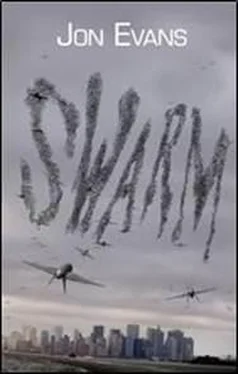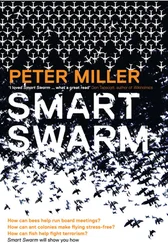By which she meant more than a mile. We passed vast segmented tents that looked like giant caterpillars, and whole suburbs of trailers surrounded by sandbags and walled by intermittent rows of concrete barriers. There were soldiers everywhere, on foot or waiting at bus stops. Most carried M-16s and wore helmet and armour despite the blistering sun. None paid us any attention.
The DFAC was a huge cafeteria tent in which sour-looking Sri Lankans served surprisingly good food to anyone with an ID card. I ate scrambled eggs and Frosted Flakes, feeling like a Cold War mole behind American lines, like at any moment someone was going to tap me on the shoulder and tell me the game was up. Afterwards we walked to a shipping container transformed into a Starbucks clone named Green Beans, presumably because the day had henceforth been insufficiently surreal, and drank lattes. Only then did Lisa look at her watch and pronounce our mission ready to begin.
“You sure?” I asked sarcastically. “You don’t want to go shopping at the PX first?”
She gave me a look. “Let’s get going.”
Most people weren’t supposed to know that LSA Python numbered among its features a secret CIA prison. During the Bush administration it had been used to hold and interrogate victims of extraordinary rendition. It had been empty since, until Sophie’s arrest.
The prison was surrounded by two massive, concentric 20-foot-high segmented concrete walls topped by concertina wire. Two sandbagged gun emplacements watched over its sole entrance. We took up positions on its opposite site, a safe distance away, near a field full of Porta-Potties lined up in neat rows, orienting ourselves by the GPS on the Android phones we had been given in Dubai. It was 10:20 AM. Four minutes to go before the roller coaster that my life had become finally began to plummet straight downwards. Trust Jesse and LoTek to pick a start time that looked like a power of two. I felt dizzy, my muscles twitched, my blood felt slow and thick in my veins. I forced myself to breathe deeply and try to relax.
A faint whine tickled at our eardrums. First one, then another, and then more, raking at our auditory nerves like a distant hornet’s nest, a dissonant and fluctuating chord. An all too familiar sound.
The whining drone that appeared low in the sky was crude and slow compared to the Russians’, and wobbled a little in the desert wind. It flew so low that we saw it only seconds before it dove down to the prison and exploded.
The flash was so bright I saw spots. Then, a fraction of a second later, the dense sound of the explosion rippled through the air: crump! We felt it more than heard it, and I shuddered involuntarily at this sudden violation of the unwritten contract that the fabric of the world must remain steady and inviolate.
Seconds later another drone appeared, plummeted, vanished into a flower of flame with another crump! , this one a little louder, followed by a distant cacophony of shouts. They in turn were drowned out by a howling siren.
We were far away from any soldiers, but we saw them react to the siren: in the distance, in every direction, they ran for safety, stopped their Humvees in the middle of the street and jumped out to rush for cover. The standard red-alert protocol for Taliban mortar attacks. We were counting on it.
The third drone opened up a huge hole in the outer wall. When the dust began to clear we could see, through the shimmering heat, the matching hole in the inner wall, and the featureless concrete block that was the prison proper. A crater full of zigzagging hairline fractures had opened in its side, but its integrity had not yet been compromised.
The fourth drone took care of that. I hoped desperately that our source was right, and Sophie’s cell was underground, on the other side of the building. The fifth flew straight into the massive, jagged aperture in the building and erupted inside. That final explosion was the one that mattered. It was much quieter than the first four.
It had all happened in thirty seconds.
I looked around. There were no soldiers in sight. Lisa already had her gas mask in hand. I had rehearsed putting on my mask while in Dubai, but my hands had lost their fluency, the straps seemed foreign, incomprehensible. For a moment I feared disaster. Then Lisa’s strong fingers were over mine, arranging the mask on my face.
“Come on,” she said, her voice muffled, “ move .”
As we dashed for the sundered prison walls we heard a violent and bloodcurdling noise, like the fabric of reality itself being torn. The sound of jets being scrambled. Too little too late.
The holes the drones had opened in the walls were sufficiently massive that we hardly had to scramble over any rubble. We had more explosives with us, to open any blocked passageways, but it wasn’t required, to my relief. Time had never been more of the essence.
The air inside the prison had an odd visual texture, a shimmer like some kind of transparent smoke, warping but not obscuring vision. Men and women in uniforms and civilian garbs lay collapsed in hallways and doorways. They looked dead, but I hoped I knew better.
The first drones had been aimed at an empty corner of the prison. The fifth and final drone had carried homemade nerve gas, courtesy of the twin Grassfire biohackers, much like what the Russians had used against the terrorists who had held a Moscow theatre hostage a decade ago: odorless, almost invisible, it would quickly render unconscious everyone who breathed in even a trace. But guaranteed nonlethal, the twins had assured us.
We raced down a concrete hall, past fallen soldiers and CIA agents. The steel doors at its end were shut. Lisa produced a card, inserted it into the reader, pressed her finger against a scanner. The doors slid open: LoTek’s work again. We dashed down stark passageways, into a stairwell, down a floor, through another secured door. A low siren yodelled relentlessly up above.
We didn’t know exactly where Sophie was, and we didn’t have much time, but we did know she was the prison’s only resident; and despite LoTek’s disavowal of the notion, we got lucky. Sophie lay curled in fetal position on a bunk behind the first door we opened, shivering with terror. The gas hadn’t filtered down to the cells yet.
When I saw her it felt like being struck by lightning.
“Miss Warren,” Lisa said, holding out a third gas mask, “you need to put this on.”
She rolled over, stared at us wide-eyed, half-panicked. “It’s happening,” she hissed. “I told you. The Russians. They didn’t wait for the G8. It’s too late for anything now. It’s started.”
I said, “This from the same woman who’s spent her whole life telling me not to jump to unwarranted conclusions on insufficient evidence.”
Our faces were obscured and our voices muffled by the gas masks, but my words, intonation, and body language were enough: her jaw dropped open and she gaped at me, transfixed by the spear of recognition. “ James? ”
“Here’s a crazy idea, let’s have the heartwarming reunion after the prison break,” Lisa suggested, and stepped forward to force the gas mask on Sophie. She didn’t resist. She seemed frozen by the shock of my impossible appearance. I couldn’t help but enjoy her reaction a little.
“Come on, clock’s ticking,” Lisa said, draping a lanyard with an ID card over Sophie’s gas-masked head. Her point was punctuated by another distant explosion. “That’s our getaway cover. Move .”
We exited the prison less than three minutes after we entered. That had always been our only hope: either blink-and-you-miss-it smash-and-grab, or disaster. Between the drones, the nerve gas, LoTek’s hacks, and LSA Python’s red-alert lockdown policy, we just might escape before the US military and/or CIA began to realize that this was not an aerial assault but a prison break. So far everything was going perfectly. I could tell by the way that we hadn’t been shot, blown up, or captured yet.
Читать дальше












